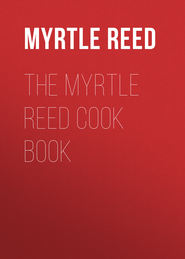По всем вопросам обращайтесь на: info@litportal.ru
(©) 2003-2024.
✖
Threads of Grey and Gold
Настройки чтения
Размер шрифта
Высота строк
Поля
“You’ve got to write it,” she returned. “I know you can, and I won’t let you go until you promise me.”
I wrenched myself away from her, white with wrath, and got to my room before she did, though she was still pursuing me. I locked my door and had a hard fight for my self-control. From the beach came the distant boom of the surf, mingled with the liquid melody of the returning breakers.
Later, just as I had finished dressing for dinner, there was a tap at my door. My friend (?) stood there beaming. “Have you got it done? You know you promised to write me a description of that storm!”
She remained only three days longer, and I stayed away from her as much as possible, but occasional meetings were inevitable. When the gladsome time of parting came, she hung about my neck.
“I want you to come and see me,” she said. “You know you haven’t done what you said you would. Don’t you forget to write me a description of that storm!”
My business arrangements with my publishers are seemingly a matter of public interest. I am asked how much it costs to print a book the size of mine. People are surprised to find that I do not pay the expenses and that I haven’t the least idea of what it costs.
Then they want to know if the publisher buys the book of me. I explain that this is sometimes done, but that I myself am paid upon the royalty basis, – per cent. on the list price of every copy sold. This seems painfully small to the dear public, but it is comparatively easy to demonstrate that the royalty on five or six thousand copies is quite worth while.
They shortly come to the conclusion, however, that the publishers make more money than I do, and that seems to them to be very unfair. They suggest that if I published it myself, I should make a great deal more money!
It is difficult for them to understand that writing books and selling books are two very different propositions – that I don’t know enough to sell books, and that the imprint of a reputable house upon the title-page is worth a great deal to any author.
“Well,” a man once said to me, “how much did you make out of your book this year?”
I explained that the percentage royalty basis was really an equal division of the profits, everything considered, and that all the financial risk was on one side. I named my few hundreds, with which I was very well satisfied. He absorbed himself in a calculation on the back of an envelope.
“I figure out,” said he, at length, “that they must have made at least a third more than you did. That isn’t fair!”
My ire arose. “It is perfectly fair,” I replied. “Paper is cheap, I know, but composition isn’t, and advertising isn’t. They are welcome to every penny they can make out of my books. I’d be glad to have them make twice as much as they do now, even if my own income remained the same.”
At this point, I became telepathically aware that I was considered crazy, so I changed the subject.
I am often asked how I happened to meet my publishers and “get in with them,” and as a very great favour to me, and to them, I am offered the privilege of sending them some “splendid novel which was written by a friend” of somebody – as they know me, “they have decided to let my publishers have the book!”
They are surprised to hear me say that I have never met any member of the firm, though I was in the same city with them for over a year. More than this, there is nothing on earth, except a green worm, which would scare me so much as a summons to that publishing house.
I have walked by in fear and trembling. I have seen a huge pile of my books in the window, and on the bulletin board a poster which bore my name in conspicuous letters, as if I had been cured of something. But I should no more dare to go into that office than I should venture to call upon the wife of the President with a shawl over my head, and my fancywork tucked under my arm.
This is incomprehensible to the uninitiated. The publishers have ever been most courteous and kind. They are people with whom it is a pleasure to have any sort of business dealings, but we are not bosom friends – and I very much fear that they do not care to become chummy with me.
There may be some authors who have taken nerve tonics and are not afraid to meet an editor or publisher. I have even read of some who will walk cheerfully into an editorial sanctum – but I’ve never seen a sanctum, nor an editor, nor a publisher. I don’t even write to an editor when I send him a piece – just put in a stamp. He usually knows what to do with it.
Fame, or long experience, may enable authors to meet the arbiters of their destiny without becoming frightened, but I have had brief experience, and still less fame. The admirable qualities of the pachyderm may have been bestowed upon some authors – but not on this one.
The Man Behind the Gun
Now let the eagle flap his wings
And let the cannon roar,
For while the conquering bullet sings
We pledge the commodore.
First battle of a righteous war
Right royally he won,
But here’s a health to the jolly tar —
To the man behind the gun!
Now praise be to the flag-ship’s spars —
To the captain in command,
And honour to the Stripes and Stars
For whose defence they stand;
And for the pilot at his wheel
Let the streams of red wine run,
But here’s a health to the man of steel —
The man behind the gun!
Here’s to the man who does not swerve
In the face of any foe;
Here’s to the man of iron nerve,
On deck and down below;
Here’s to the man whose heart is glad
When the battle has begun;
Here’s to the health of that daring lad —
To the man behind the gun!
Now let the Stars and Stripes float high
And let the eagle soar;
Until the echoes make reply
We pledge the commodore.
Here’s to the chief and here’s to war,
And here’s to the fleet that won,
And here’s a health to the jolly tar —
To the man behind the gun!
Quaint Old Christmas Customs
Compared with the celebrations of our ancestors, the modern Christmas becomes a very hurried thing. The rush of the twentieth century forbids twelve days of celebration, or even two. Paterfamilias considers himself very indulgent if he gives two nights and a day to the annual festival, because, forsooth, “the office needs him!”
One by one the quaint old customs have vanished. We still have the Christmas tree, evergreens in our houses and churches, and the yawning stocking still waits in many homes for the good St. Nicholas.
But what is poor Santa Claus to do when the chimney leads to the furnace? And what of the city apartment, which boasts a radiator and gas grate, but no chimney? The myth evidently needs reconstruction to meet the times in which we live, and perhaps we shall soon see pictures of Santa Claus arriving in an automobile, and taking the elevator to the ninth floor, flat B, where a single childish stocking is hung upon the radiator.
Nearly all of the Christmas observances began in ancient Rome. The primitive Italians were wont to celebrate the winter solstice and call it the feast of Saturn. Thus Saturnalia came to mean almost any kind of celebration which came in the wake of conquest, and these ceremonies being engrafted upon Anglo-Saxon customs assumed a religious significance.
The pretty maid who hesitates and blushes beneath the overhanging branch of mistletoe, never stops to think of the grim festival with which the Druids celebrated its gathering.
In their mythology the plant was regarded with the utmost reverence, especially when found growing upon an oak.
At the time of the winter solstice, the ancient Britons, accompanied by their priests, the Druids, went out with great pomp and rejoicing to gather the mistletoe, which was believed to possess great curative powers. These processions were usually by night, to the accompaniment of flaring torches and the solemn chanting of the people. When an oak was reached on which the parasite grew, the company paused.
Two white bulls were bound to the tree and the chief Druid, clothed in white to signify purity, climbed, more or less gracefully, to the plant. It was severed from the oak, and another priest, standing below, caught it in the folds of his robe. The bulls were then sacrificed, and often, alas, human victims also. The mistletoe thus gathered was divided into small portions and distributed among the people. The tiny sprays were fastened above the doors of the houses, as propitiation to the sylvan deities during the cold season.
These rites were retained throughout the Roman occupation of Great Britain, and for some time afterward, under the sovereignty of the Jutes, the Saxons, and the Angles.
In Scandinavian mythology there is a beautiful legend of the mistletoe. Balder, the god of poetry, the son of Odin and Friga, one day told his mother that he had dreamed his death was near at hand. Much alarmed, the mother invoked all the powers of nature – earth, air, water, fire, animals and plants, and obtained from them a solemn oath that they would do her son no harm.











